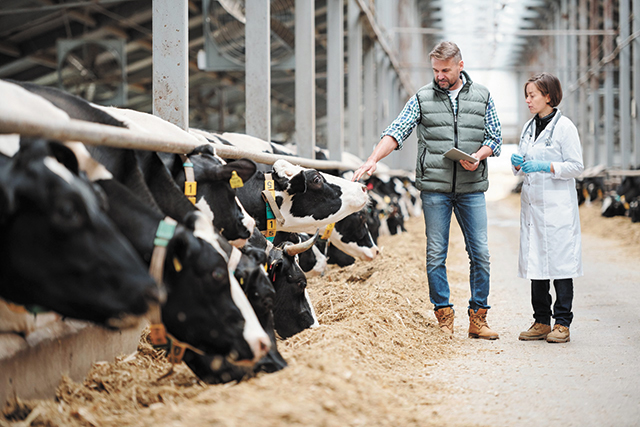
During last fall’s run, several cattle operations enlisted their veterinarians for a number of duties including pregnancy diagnosis, implementing vaccination protocols, and aiding culling decisions. During all times of the year, management factors like these play a role in the success of the farm, herd, and business. As external factors continue to add stress to the cattle operation, such as drought, marketing challenges, and human health factors, it is important to realize the other services that veterinarians can provide. The value of the veterinarian-client-patient relationship (VCPR) to the cattle producer and their cattle should not be overlooked.
A VCPR is legally defined by State and Federal statutes as well as by the American Veterinary Medical Association. An established VCPR allows the veterinarian to diagnose and treat animals, prescribe medications, and issue Certificates of Veterinary Inspection (CVIs) or health certificates. Because the VCPR is required to be renewed annually, a yearly consultation with your veterinarian is recommended where multiple facets of the operation are evaluated, goals for the next year are set, and potential interventions are considered. This meeting can provide in-depth understanding of the operation’s capabilities and limitations which can help shape future recommendations. Contributions from veterinarians span a breadth of topics including, but not limited to, those discussed below.
Cow/Calf Management
Developing annual vaccination and parasiticide considerations at specific times throughout a bovine’s life is routine for most veterinarians. In this unforgettable year, nutrition considerations and range management options could be discussed with your veterinarian to maximize feed and cattle efficiency. Veterinarians may assist with mineral programs, toxicology inquiries, and sampling of feed or water samples to best utilize your resources. Opportunities to adjust your breeding, weaning, or preconditioning program could be discussed with the veterinary team.
Biosecurity, Disease Surveillance, and Outbreak Investigations
Veterinarians are trained to evaluate individual animals within a herd system and provide integrative management plans to prevent diseases or problems from occurring in the future. For instance, in a scours outbreak, your veterinarian will be able to evaluate and treat the sick calf, take appropriate samples, and provide recommendations in real time. Next steps would be submitting samples and interpreting results to make management decisions to protect the other calves in the herd, such as completing a necropsy for a better diagnosis, changing pastures to reduce pathogen load, or evaluating newborn calf care and colostrum management. Preventing germs from entering your herd or identifying those pathogens requires some planning and preparation. The Checkoff-funded Beef Quality Assurance (BQA) program is currently developing a daily biosecurity plan template that would be valuable for the producer and veterinarian to complete together as a team. Understanding current risks and preventing future risks is essential to protecting the herd and it helps to have an outside set of eyes evaluating the operation.
Record Keeping
The value of good record keeping goes beyond knowing if a cow successfully raised a calf every year. With herd analytics, veterinarians can help you improve your herd’s conception, pregnancy, and even stocking rates. As discussed in the BQA program, record keeping also helps recognize withdrawal times from animal health products and prevent residues from showing up in the food supply. Having an objective view of your operation could provide insight to potential improvements. Self-assessment resources for the cow/calf, stocker, and feed yard sectors can be found at bqa.org and would be valuable templates for your veterinarian to critically evaluate the operation. This could include collaborating to create treatment or training protocols to focus on continuous improvement.
Emergency Services
Having support from your veterinarian in the event of an emergency is vital to the health and welfare of your animals. Ideally, the relationship with your veterinarian does not begin through an emergency appointment at midnight. Once that relationship is developed, you now have a resource available for those moments when professional expertise is needed.
Each operation is unique and finding a veterinary practice that supports the needs of your operation is essential. Veterinarians are one branch of your operation’s resource team and can help with short-term and long-term goals towards profit and sustainability. Building a comprehensive management plan for your herd with your veterinarian will help you and your operation adapt to unforeseen obstacles.
By Julia Herman, DVM, MS, Beef Cattle Specialist Veterinarian,
NCBA, a contractor to the Beef Checkoff
